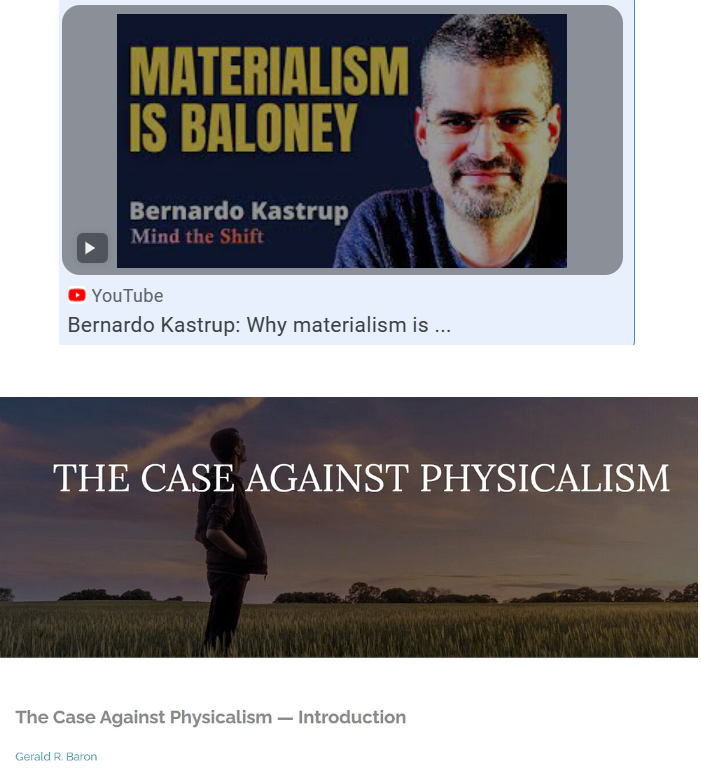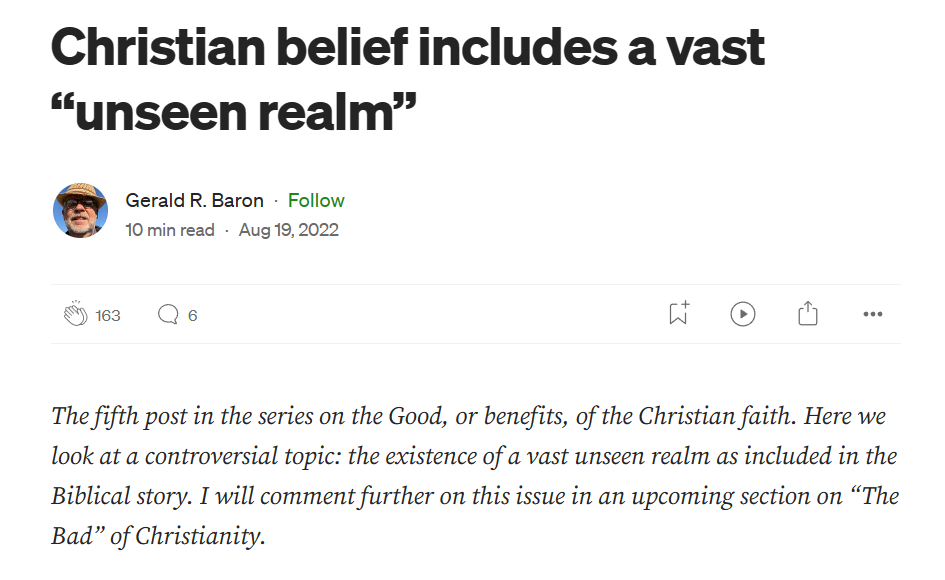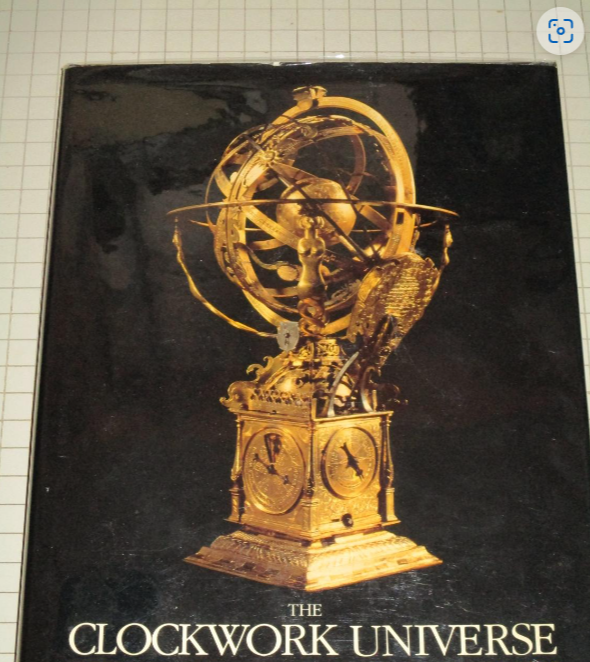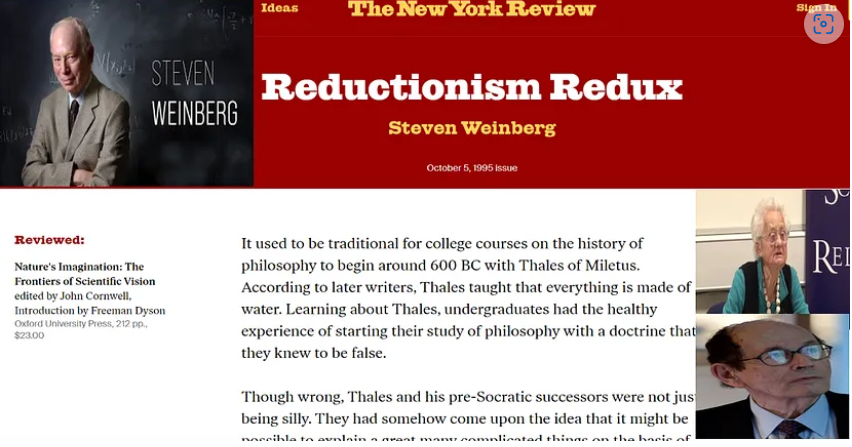
The Medium writer Gerald R. Baron tells his readers what he takes physicalism to be:
“[Physicalism is the] belief system that says all that all there is is explained by causes within a closed universe — no external causes allowed and certainly nothing supernatural or transcendent.”
The words “a belief system that says all that all there is is explained by causes within a closed universe” are okay, and most physicalists won’t have a problem with them. (I’m not sure about the words “belief system”, which seem too rhetorical and all-encompassing.) However, the final words “no external causes allowed and certainly nothing supernatural or transcendent” show us precisely what is important and relevant to Gerald Baron.
From those words (as well as from many other passages from Baron), it can safely be concluded that literally any scientific and philosophical position is physicalist if it rejects (or simply ignores) the “supernatural or transcendent”. This means that countless scientific and philosophical positions can now be deemed “physicalist” according to Baron’s own definition. Indeed, perhaps all scientific and philosophical positions which reject (or simply ignore) the supernatural or transcendent are physicalist in Baron’s book.
All that explains why Baron takes so many positions to be examples of “physicalism”, and so many people to be “physicalists”. In other words, if a scientist, philosopher or layperson doesn’t “allow any room for the transcendent”, then, by Baron’s definition, he or she simply must be a physicalist.
And all this may also explain why Baron rarely quotes any physicalists, let alone goes into detail about their positions or precise arguments. It’s enough for him to note that physicalists don’t allow any room for the transcendent or supernatural…
However, the British philosopher Galen Strawson (as far as I can see) is one exception to this.
Baron tackles Strawson primarily because the latter offers arguments actually against physicalism. Yet, Baron has realised, those arguments still don’t include the supernatural and transcendent!…
Thus, Baron classes Strawson’s position as (to use his own words) “physicalist panpsychism”. That said, Strawson does use this term about his own position. [See here.]

Incidentally, spiritual idealist Bernardo Kastrup does something very similar to Baron. That is, he classes virtually all people who aren’t idealists (perhaps idealists only of his very own brand) as “materialists”…
That position may be panpsychism, but it’s still materialist.
That position may be anti-realist, but it’s still materialist.
Indeed, even the positions advanced by David Chalmers (who’s offered very strong arguments against physicalism which surpass anything written by Baron or Kastrup) are still deemed to be “materialist” by both Baron and Kastrup. And that’s simply because — again — Chalmers doesn’t bring on board (what Baron calls) “the supernatural or transcendent”.
In Kastrup’s own words:
“David Chalmers recapitulates the mainstream physicalist argument that, because the physical world is putatively causally-closed, phenomenal states must be physical states [].”
This basically means that if you don’t accept Kastrup’s entire worldview, then, virtually by definition, you must be a “materialist”. [See Kastrup’s Further reply to Philip Goff.] And pretty much the same can be said about Baron’s position on what he calls “physicalists”.
Baron certainly believes that most (even all?) types of panpsychism are “physicalist”, not only Galen Strawson’s version. [See Baron’s ‘Panpsychism and its problems’, which offers arguments which are very similar to Kastrup’s.]
Baron’s Transcendent and Supernatural Alternative

As already stated, Gerald Baron aims his words against what he calls “physicalism”. He writes:
“The mainstream position of science today is physicalism which says there is no reality beyond matter and the forces which dictate how matter behaves.”
Baron then advocates his own alternative:
“The ‘top-down’ understanding of reality held sway for all of human history except for the past hundred to two hundred years. It holds that reality includes more than matter and forces and that consciousness or mind or thoughts or soul are real, may constitute a separate part of reality (dualism) and likely pre-date matter and the controlling laws and forces.”
As can be seen, Baron firmly connects science to physicalism in the words above.
Yet most practicing physicists certainly don’t spend much — or even any — time talking about “reality” in their papers. In simple terms, “reality” isn’t even a term of physics. However, some popular-science writers (who’re also physicists) do indeed discuss reality in their popular books.
What’s more, virtually no scientist I know spends any time at all discussing physicalism. That said, someone like the cognitive psychologist Donald Hoffman does. However, not qua cognitive psychologist, but qua philosophical idealist. (Hoffman uses his own term for idealism — “conscious realism”.)
Baron on the Clockwork Universe

Gerald Baron’s words “there is no reality beyond matter and the forces which dictate how matter behaves” need to be untangled.
They can be taken to mean that there literally are no cups, trees, brains , football matches, acts of sexual intercourse, etc. — there’s only matter and forces. [I assume that most physicists and physicalists aren’t committed to what philosophers call mereological nihilism.]
It’s certainly true that cups, trees, brains, sexual intercourse, football matches, etc. aren’t the subject matter of physics. However, no physicist I know would say that such things “don’t exist”. (Some philosophers may do so.) Many physicists wouldn’t even bother saying that matter and forces “determine” the nature of sexual intercourse, trees, brains, football matches, etc. However, they may say (if pushed) that sexual intercourse, brains, trees, football matches, etc. wouldn’t exist if it weren’t for matter and forces. (That would be an almost pointless statement.) Yet they still wouldn’t need to argue that (as Baron has it) “only matter and the forces exist”.
Baron then concludes with the following words:
“This results in a ‘clockwork’ universe where all is determined by the laws of nature and free will is an illusion.”
This is incredible.
Baron seems to believe that physicalists and physicalist physicists (if there are any) are still stuck in the early 19th century.
Physicists have rejected large parts of the “clockwork universe” analogy since the 19th century, and even well before that. (This entry on the ‘Clockwork universe’ doesn’t mention anyone or anything after Gottfried Leibniz.) They’ve certainly done so since Albert Einstein’s work on relativity and the quantum revolution of the 1920s.
So is Baron claiming that physicalists (if not physicists themselves) have ignored all this, and are still in pre-1920s mode? Yet I don’t know of a single physicalist who believes in the clockwork universe as it was originally understood in the 17th and 18th centuries. [See my last essay ‘Spiritual Anti-Materialists Believe Materialists Are Stuck in the 19th Century’.]
So all this inevitably leads to the following question:
Has Gerald R. Baron actually read any physicalists (i.e., other than Galen Strawson)?
Is Baron either tilting at windmills or constructing straw targets here?
What’s more, is all this the result of him never having read any contemporary (or even any 20th century) physicalists?
It’s certainly the case that Baron (along with other anti-materialists) rarely (if ever) quotes contemporary physicalists — at least not when when they argue for physicalism.
[Bernardo Kastrup does tackle the arguments of physicalists and other contemporary philosophers. And then often abuses them.]
So perhaps Baron holds a similar position to, for example, the British philosopher and ethicist Mary Midgley (who will have read many physicalists).
Mary Midgley on Scientific Reductionism

In the details to be tackled below, Mary Midgley (1918–2018) was actually talking about what she called “reductionism”. That said, Gerald Baron did tell us that “physicalism [] says there is no reality beyond matter and the forces which dictate how matter behaves” — a stance which can be seen to lead to reductionism.
Midgley’s words on scientific reductionism (i.e., not actually on physicalism/materialism as such) can be found in her article ‘Reductive Megalomania’, which itself appears in the book, Nature’s Imagination: The Frontiers of Scientific Vision.
Midgley asked the following questions:
“‘What, for instance, about a factual statement like ‘George was allowed home from prison at last on Saturday?’ How will the language of physics convey the meaning of ‘Sunday’? or ‘home’ or ‘allowed’ or ‘prison’? or ‘at last’? or even ‘George’?’”

The American theoretical physicist Steven Weinberg (who died in 2021) responded to this passage by saying that
“[t]his criticism would strike home if there were physicists who were trying to use physics for such a purpose, but I don’t know of any”.
Perhaps readers should give Midgley the benefit of the doubt here and assume that she must have been discussing (as it were) possible reductionism. In other words, perhaps Midgley simply meant that reductionism could go down this dangerous rabbit hole if scientists — and perhaps the public too — weren’t careful.
Does this mean, then, that Midgley wasn’t actually claiming that any physicists have attempted to reduce statements like “George was allowed home from prison at last on Saturday” to physics? Was she simply arguing that this could be the case if we don’t watch out?
Alternatively seen, it might have been a simple reductio ad absurdum on Midgley’s part.
As it is, it can be doubted that these diplomatic interpretations of her words are correct. Indeed, Midgley herself didn’t explain why she believed that some — or even any — physicists would want to reduce the sentence “George was allowed home from prison at last on Saturday” to physics.
And why didn’t she name any names?
Was it because this is precisely how many self-styled anti-reductionists do see (what they take to be) reductionism (with its, to use E.O. Wilson’s words, “hissing suffix”)?
Firstly, no physicist would ever even attempt to reduce the sentence “George was allowed home from prison at last on Saturday” (or even the referents of any of the words within it) to physics. That simply because that sentence and its contents aren’t in the domain of physics in the first place.
Yet that last statement about not reducing “George was allowed home from prison at last on Saturday?” to physics isn’t only an expression of what anti-reductionists would warn physicists against. No physicist himself would deem this area to be the domain of physics. Indeed, the very idea of reducing the event (let alone the previous sentence) George being let out of prison, George himself, a prison, Saturday, etc. to physics is really quite ridiculous.
Steven Weinberg himself spotted the problem with Midgley’s position.
Although Weinberg didn’t state that Midgley held this position herself, Weinberg did claim that
“many of our fellow citizens think that George behaves the way he does because he has a soul that is governed by laws quite unrelated to those that govern particles or thunderstorms”.
What now needs to be said is that many non-religious philosophers and laypersons do take this position without also believing in a soul (at least as the soul is seen in various religions). That is, all (or at least most) anti-physicalists do take the position expressed by Weinberg directly above. However, in order to see that all the reader needs to do is take out the word “soul”, and substitute it with the word “mind”, “consciousness” or “person”.
So (again) who, exactly, was Midgley arguing against, and warning us about?
Perhaps it was the English molecular biologist and neuroscientist Francis Crick (1916–2004).
More accurately, perhaps it was a very-well-known passage from Crick which has been quoted innumerable times. (Nearly always negatively or critically.) That infamous often-quoted passage can be found in Crick’s 1994 book, The Astonishing Hypothesis: The Scientific Search for the Soul.
So here goes:
“‘You’, your joys and your sorrows, your memories and your ambitions, your sense of personal identity and free will, are in fact no more than the behavior of a vast assembly of nerve cells and their associated molecules.”
In fact, if readers Google the passage above, they’ll see there are 19 pages (or more) of links (with 10 entries on each page — that’s 190 separate links) to papers, articles, essays, books, etc. which quote Crick’s words. [See here.]…
And, guess what, Mary Midgley herself did indeed refer (more than once) to this passage from Crick.
For example, she did so in her book Are You an Illusion?. What’s more, Midgley also referred to it in the Guardian, New York Times and Philosophy Now. [See here, here and here.]
However, it can be said that even in those infamous words above, Crick isn’t literally advising reducing “‘you’, your joys and your sorrows, your memories and your ambitions, your sense of personal identity and free will” to the brain, neurons, biochemistry or to anything else…
But that’s another subject entirely.
(*) See my ‘Francis Crick’s Deliberately Provocative Reductionism’.
(**) See my last essay, ‘Spiritual Anti-Materialists Believe Materialists Are Stuck in the 19th Century’. See also my ‘Gerald R. Baron’s Religious “Crusade” Against Materialism’.

No comments:
Post a Comment